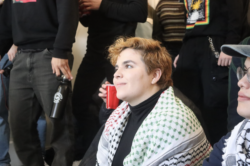Campaigns for the election for Georgetown University Student Association executive launched Thursday at midnight and will run until the election on Feb. 27. The four tickets in the race are Trevor Tezel (SFS ’15) and Omika Jikaria (SFS ’15), Thomas Lloyd (SFS ’15) and Jimmy Ramirez (COL ’15), Ben Weiss (COL ’15) and Sam Greco (SFS ’15), and Zach Singer (COL ’15) and Dan Silkman (COL ’15) for the positions of president and vice president, respectively.
The four tickets’ slogans are Weiss and Greco’s “Working for You,” Lloyd and Ramirez’s “Together with Georgetown,” Singer and Silkman’s “Building Your Georgetown”, and Tezel and Jikaria’s “Connect to Georgetown.”
The platforms of the tickets, which all candidates discussed in interviews with the Voice, include common themes of free speech, student rights, accessibility to University space and benefits, student-administration engagement, diversity and pluralism, and improving academic life.
Lloyd and Ramirez emphasized Lloyd’s experience in advocating for free speech as president of GU Pride and proposed a GUSA free speech advisory group and a clearer way to petition administration to avoid “writing an editorial in the Voice or Hoya every time [people are] afraid to speak up.” They also proposed a tiered system of levels of access to benefits for clubs as opposed to the current “all or nothing” approach.
In regards to student space, Weiss and Greco proposed opening up academic study spaces in Riggs Library and Carroll Parlor and allowing of-age students to rent out the Village C West Alumni Lounge for parties. They also expressed ideas to streamline club funding by changing student advisory boards to be representative, not appointed, and creating an overall student board.
Both the Greco/Weiss and Singer/Silkman tickets discussed student-administration engagement at length. Weiss and Greco expressed a focus on fostering positive student-administration relationships. Singer and Silkman said they would be proactive with the administration and exemplified the “One Georgetown, One Campus” campaign from September, led by Singer, as successful GUSA-related activism.
In regards to diversity, Tezel and Jikaria aim to engage underrepresented groups through instituting a GUSA multicultural council.
When discussing academic life, Weiss and Greco emphasized ideas for expanding availability for academic credit for internships and community-based learning and greater cross-school collaboration.
Both Singer/Silkman and Lloyd/Ramirez discussed expanding the reach and benefits of What’s a Hoya, GUSA’s freshman education series launched in the fall semester for which Silkman is one of three coordinators. Lloyd and Ramirez emphasized using What’s a Hoya as a “branding mechanism” and establishing a proposed What’s a Hoya fund, envisioned as a revival of the obsolete Diversity Action Council fund, to publicize, fund, and spread the housing point incentive to non-GUSA events.
The candidates are a mix of three GUSA “outsiders,” as Lloyd, Jikaria, and Silkman characterize themselves, and five GUSA “insiders,” as current GUSA Chief of Staff Singer, GUSA Deputy Chief of Staff Tezel, and GUSA Senators Greco, Weiss, and Ramirez all identified themselves. All five of the latter believed potential concerns of being insular and disconnected from the student body at large did not apply to them.
“[Being labeled as insiders] was one of our hesitations,” Greco said. “[Yet, although] we’ve done GUSA since we were freshmen, that also makes us extremely capable at this job.”
The three candidates who consider themselves outsiders, likewise, expressed that they’d work effectively in GUSA.
“Even though I haven’t had [GUSA] access, I’ve still been able to affect serious policy changes. … Joining GUSA would give me more access and amplify my ability to make change on a multitude of issues,” Lloyd said.
When asked, all four tickets said they would definitely knock on doors.
“Door-knocking is an important medium for interaction with students,” Singer said.
“There’s a balance that needs to be played. … There’s sometimes a frequency where it bothers people, and that’s completely understandable,” Tezel said.





